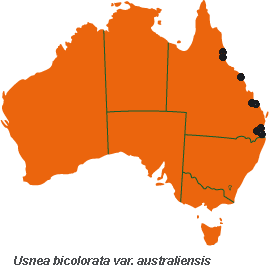



Australian Biological Resources Study
| Checklist of the Lichens of Australia and its Island Territories | ||
| Introduction | A–D | E–O | P–R | S–Z | Oceanic Islands | References | ||
| Usnea bicolorata Motyka var. australiensis G.N.Stevens | ||
| Biblioth. Lichenol. 72: 32 (1999). T: 7 km SE of Millaa Millaa, Atherton Tableland, Qld, 1988, G.N.Stevens 5403; holo: MEL; iso: BRI. | ||
| Thallus shrubby, erect to subpendulous or decumbent, to 10 (–17) cm long, pale green with a pink-orange tinge; branching subdichotomous to irregular; trunk with or without annular cracks, pale greenish or black; branches terete, slender, to 1 mm wide; apices tapered; branchlets few to numerous, bearing pseudocyphellae; fibrils mainly in basal part, sparse to dense, to 3 mm long. Isidia sparse or rather dense, in pseudocyphellae; pseudocyphellae numerous, large and conspicuous towards apices; papillae sparse to dense; soralia absent. Cortex glossy. Medulla dense, narrow, with subcortical orange-red pigment; axis 3/5 width of branch, hyaline. Apothecia rare. CHEMISTRY: Cortex containing usnic acid. Medulla K+ yellow → orange-red; containing salazinic acid (minor), galbinic acid (major), norstictic acid (minor), connorstictic acid (trace) and consalazinic acid (trace). |  |
|
| An uncommon endemic on bark and fence posts in open, montane forest and rainforest in eastern Qld. | ||
| Stevens (2004) | ||
| Checklist Index |
| Introduction | A–D | E–O | P–R | S–Z | Oceanic Islands | References |
This work is copyright. Apart from any use as permitted under the Copyright Act 1968, no part may be reproduced by any process without prior written permission from Australian Biological Resources Study. Requests and inquiries concerning reproduction and rights should be addressed in the first instance to Dr P. McCarthy. These pages may not be displayed on, or downloaded to, any other server without the express permission of ABRS.